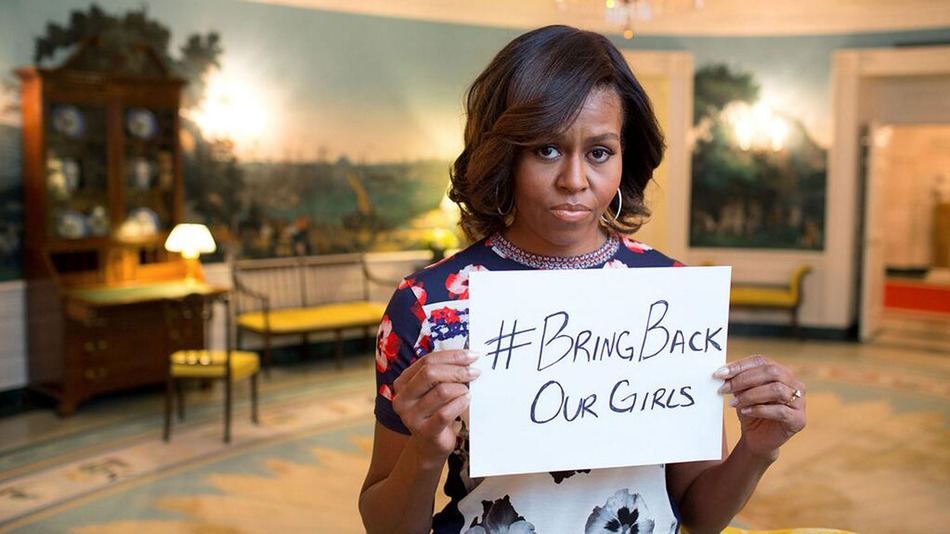Western Governments Knew Location Of Girls Kidnapped By Boko Haram: Official

NEW DELHI: A former British High Commissioner to Nigeria, Dr. Andrew Pocock, has said that western governments knew all along the location of the 276 school girls that were kidnapped by Boko Haram from Chibok in April 2014. The incident brought Boko Haram into international limelight, sparking the #BringBackOurGirls movement and levelling pressure on the Nigerian government to tackle the growing menace of the militant group.
Given the international stir the kidnappings caused, Pocock’s revelations acquire added context. The former High Commissioner said that British and American surveillance found the location of up to 80 of the kidnapped girls, but a rescue operation was not attempted as it was deemed to be too risky. “You might have rescued a few but many would have been killed,” Pocock told The Sunday Times of London, adding that the girls were likely to be used by the terrorists as human shields.
“A land-based attack would have been seen coming miles away and the girls killed. … An air-based rescue, such as flying in helicopters or Hercules, would have required large numbers and meant a significant risk to the rescuers and even more so to the girls,” he said, adding “You were damned if you do and damned if you don’t.”
The girls were located about a month after the kidnapping, and the information was passed on to the Nigerian government -- who made no move for additional help. The Sunday Times also reported that they had independently been sent video evidence that the girls were alive, in the form of videos of the girls being raped repeatedly by Boko Haram jihadists.
Dr. Stephen Davis, who spent months in Nigeria trying to negotiate the schoolgirls’ freedom, was quoted in the New York Times saying that South African mercenaries working with the Nigerian military had released around 1,000 other girls who had been abducted by Boko Haram, and hence, the logic behind not to act is questionable. “If [South African mercenaries] could release that many,” he says, “that belies the argument that the girls would be killed in the process.”
Since the kidnappings, a few of the girls have escaped, and the fate of those who haven’t remains unknown. Reports suggest that many have been indoctrinated and married off to jihadists -- a claim backed by Nigeria’s current President Muhammadu Buhari.
Since then, Boko Haram has carried out several other mass kidnappings, and continues to do so, stepping up its onslaught. The Nigerian people’s frustration led to a change in government, with Buhari being elected as he was perceived to be a President more capable of dealing with the group. In January this year, Buhari announced that Boko Haram had been “defeated” -- a claim that has little credence as suicide bombings and other attacks -- characteristic of the group -- continue.
The origins of Boko Haram, the official name of which is Jama'atu Ahlis Sunna Lidda'awati wal-Jihad, which in Arabic means "People Committed to the Propagation of the Prophet's Teachings and Jihad", sheds light on the specific social-economic context that has determined developments. As parts of Nigeria fell under British control in 1903, locals came to view western education with suspicion, and this resistance continued as Nigeria gained independence, with many muslim families refusing to send their children to government run “western schools.” The problem was compounded by the lack of priority given to education by the state government.
Located in this context, in 2002, Muslim cleric, Mohammed Yusuf, formed Boko Haram in Maiduguri with the intention of setting up a religious complex, which included a mosque and an Islamic school. Many families across Nigeria and the region enrolled their children in Yusuf’s school. The movement did not remain restricted to education, with the eventual aim of an Islamic state being conceived within the struggle for power that was rooted in an anti-western discourse. In 2009, the group carried out a series of attacks on official buildings in Maiduguri. The group was defeated and Yusuf was killed, but fighters regrouped and in 2010, attacked a prison in Bauchi state, setting free hundreds of the groups’ supporters.
Since then, the group’s attacks have increased in severity, with some of the worst attacks being the 2011 Christmas day bombings on the outskirts of Abuja and in Damaturu; bombing the police headquarters and the UN headquarters in Abuja in 2011; and an attack on a military barracks in Abuja in 2010.
The context is far more complicated than a mere religious rendering can do justice to. Nigerian American author and columnist offered a voice of reason when he tweeted: “I understand the impulse to "do something." But Boko Haram is irreducibly complex. Makes Kony look like child's play” and “The history of the Nigerian military "doing something" about Boko Haram has been one of mass murder of civilians.”
The threat posed by Boko Haram is not going to disappear by launching an offensive attack, which, at best will cause a temporary lull of activity till the fighters regroup and hit back even more violently. The solution to the threat is in reducing the region’s chronic poverty and building an education system which gains the support of local muslims - measures which are not being given priority to by the establishment and figure no where in the “do something” position adopted by the west or even the government in Nigeria.



